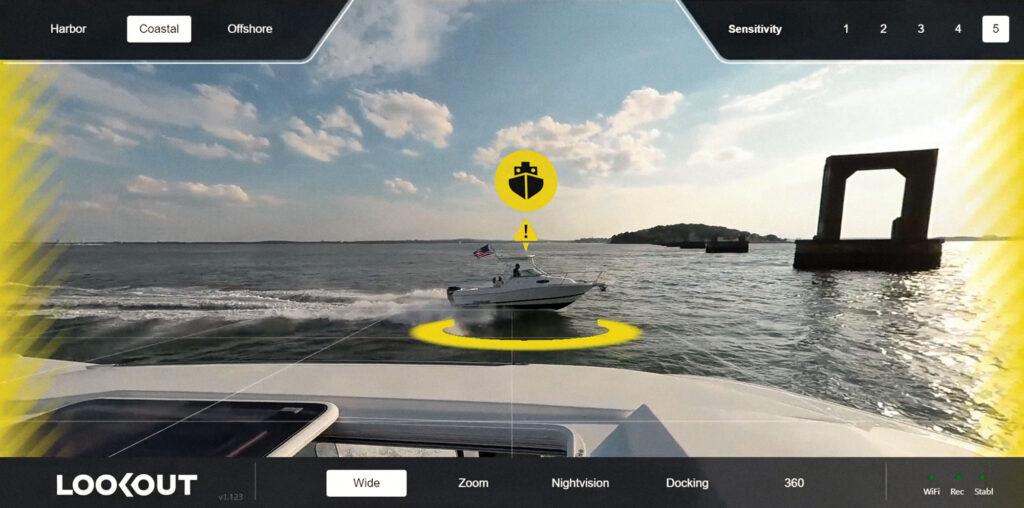AI Tech for Safer Navigation
 Lookout uses artificial intelligence to recognize and warn boaters of hazards, be it another boat or a whale.
Courtesy Lookout
Lookout uses artificial intelligence to recognize and warn boaters of hazards, be it another boat or a whale.
Courtesy Lookout
The number of boating anglers who have experienced a whale strike is very small. Yet I am one of them. A few years ago in the predawn hours, a group of undetected blue whales lay snoozing just below the surface directly in my path. A startling thump on the bottom of the boat rattled my nerves. I pulled back the throttle to check for damage. Everything was OK, but then I heard and finally saw in the gray light of dawn spouts of bellowing whales all around us. Mystery solved.
This was a glancing strike. A direct hit might have smashed the hull. I can only imagine that my little boat barely tickled the behemoth. But a larger, heavier craft with a deeper draft might have injured the whale.
In years ahead, systems utilizing artificial intelligence may well eliminate whale strikes altogether and make general navigation safer at the same time. A prime example of this exists today in the system called Lookout that can detect hazards beyond the capability of human senses.
Built by a team of leading AI researchers, video-game developers, 3D designers and hardware engineers, Lookout uses a camera system in conjunction with advanced computer algorithms to detect and track marine hazards, such as other vessels, buoys, floating debris, swimmers and, yes, whales. It’s effective day or night, and its widespread implementation could help fend off pending federal restrictions on boat speeds intended to protect whales in waters off the East Coast and elsewhere.
Lookout uses NMEA 2000 data from chart plotters, AIS, radar and other sources to create a clear, 3D-augmented reality view on multifunction displays from major brands, including Garmin, Furuno, Raymarine and Simrad, as well as smartphones.
“We’re living in an era where AI, augmented reality and spatial computing are transforming navigation and safety,” says David Rose, CEO of Lookout. “Boating should benefit from the same innovation we see in automotive and aerospace [industries].
“Lookout integrates AI tech with intuitive, beautiful and beneficial software design, providing clarity, especially in challenging conditions like low light, fog and crowded harbors.”
Augmented reality is not new to marine electronics. Raymarine has for years offered ClearCruise, which uses a stabilization module and a marine camera to turn its MFDs into head-up augmented-reality displays with color-coded callouts and critical data that can be interpreted at a glance.
However, the Lookout goes beyond this to recognize objects that may not appear on a chart plotter, AIS or even radar. It can recognize the spout, fluke or back of a whale. It can also detect a floating log. The system can also learn when connected to an optional boat service with StarLink or other internet connection that enables crowdsourcing data.
“Lookout’s sensing and data-sharing capability is what boats need today,” says Todd Tally, general manager for Atlantic Marine Electronics, a subsidiary of Viking Yachts. “Knowing when a nearby boat detects a floating log or a whale is a game-changer. Like Waze, this system provides a lookout of eyes on the water, ensuring everyone’s safety.”
Read Next: Marine Camera Systems for Fishing and Boating
The Lookout system includes an AI-optimized three-in-one camera system ($3,995) with infrared night vision, high-resolution daylight zoom, and 360-degree views for docking. Boaters can choose from two processors, both powered by NVIDIA technology to handle multiple data streams and create an intuitive augmented-reality view. The Lookout Brain retails for $4,995; the Brain Pro is $9,995 and offers higher frame rates and resolution for detecting smaller, more distant targets.
While AI is a topic fraught with controversy and concern, so is the idea of restricting boat speeds in the ocean to protect whales. Perhaps if systems such as Lookout allow anglers to continue running their boats at decent speeds, they will be far more likely to say “aye, aye” to AI.
The post AI Tech for Safer Navigation appeared first on Salt Water Sportsman.
- Home
- About Us
- Write For Us / Submit Content
- Advertising And Affiliates
- Feeds And Syndication
- Contact Us
- Login
- Privacy
All Rights Reserved. Copyright , Central Coast Communications, Inc.